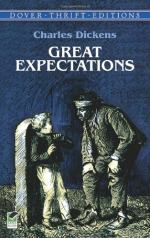But, morning once more brightened my view, and I extended my clemency to Biddy, and we dropped the subject. Putting on the best clothes I had, I went into town as early as I could hope to find the shops open, and presented myself before Mr. Trabb, the tailor: who was having his breakfast in the parlour behind his shop, and who did not think it worth his while to come out to me, but called me in to him.
“Well!” said Mr. Trabb, in a hail-fellow-well-met kind of way. “How are you, and what can I do for you?”
Mr. Trabb had sliced his hot roll into three feather beds, and was slipping butter in between the blankets, and covering it up. He was a prosperous old bachelor, and his open window looked into a prosperous little garden and orchard, and there was a prosperous iron safe let into the wall at the side of his fireplace, and I did not doubt that heaps of his prosperity were put away in it in bags.
“Mr. Trabb,” said I, “it’s an unpleasant thing to have to mention, because it looks like boasting; but I have come into a handsome property.”
A change passed over Mr. Trabb. He forgot the butter in bed, got up from the bedside, and wiped his fingers on the table-cloth, exclaiming, “Lord bless my soul!”
“I am going up to my guardian in London,” said I, casually drawing some guineas out of my pocket and looking at them; “and I want a fashionable suit of clothes to go in. I wish to pay for them,” I added — otherwise I thought he might only pretend to make them — “with ready money.”
“My dear sir,” said Mr. Trabb, as he respectfully bent his body, opened his arms, and took the liberty of touching me on the outside of each elbow, “don’t hurt me by mentioning that. May I venture to congratulate you? Would you do me the favour of stepping into the shop?”
Mr. Trabb’s boy was the most audacious boy in all that countryside. When I had entered he was sweeping the shop, and he had sweetened his labours by sweeping over me. He was still sweeping when I came out into the shop with Mr. Trabb, and he knocked the broom against all possible corners and obstacles, to express (as I understood it) equality with any blacksmith, alive or dead.
“Hold that noise,” said Mr. Trabb, with the greatest sternness, “or I’ll knock your head off! Do me the favour to be seated, sir. Now, this,” said Mr. Trabb, taking down a roll of cloth, and tiding it out in a flowing manner over the counter, preparatory to getting his hand under it to show the gloss, “is a very sweet article. I can recommend it for your purpose, sir, because it really is extra super. But you shall see some others. Give me Number Four, you!” (To the boy, and with a dreadfully severe stare: foreseeing the danger of that miscreant’s brushing me with it, or making some other sign of familiarity.)
Mr. Trabb never removed his stern eye from the boy until he had deposited number four on the counter and was at a safe distance again. Then, he commanded him to bring number five, and number eight. “And let me have none of your tricks here,” said Mr. Trabb, “or you shall repent it, you young scoundrel, the longest day you have to live.”




